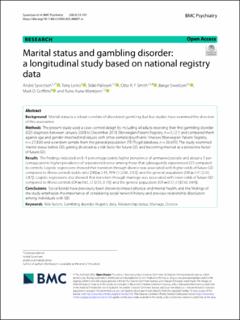Marital status and gambling disorder: a longitudinal study based on national registry data
Syvertsen, Andre; Leino, Tony Mathias; Pallesen, Ståle; Smith, Otto Robert Frans; Sivertsen, Børge; Griffiths, Mark D.; Mentzoni, Rune Aune
Journal article, Peer reviewed
Published version

Åpne
Permanent lenke
https://hdl.handle.net/11250/3064436Utgivelsesdato
2023Metadata
Vis full innførselSamlinger
Sammendrag
Background
Marital status is a robust correlate of disordered gambling, but few studies have examined the direction of this association.
Methods
The present study used a case–control design by including all adults receiving their first gambling disorder (GD) diagnosis between January 2008 to December 2018 (Norwegian Patient Registry, n = 5,121) and compared them against age and gender matched individuals with other somatic/psychiatric illnesses (Norwegian Patient Registry, n = 27,826) and a random sample from the general population (FD-Trygd database, n = 26,695). The study examined marital status before GD, getting divorced as a risk factor for future GD, and becoming married as a protective factor of future GD.
Results
The findings indicated an 8–9 percentage points higher prevalence of unmarried people and about a 5 percentage points higher prevalence of separation/divorce among those that subsequently experienced GD compared to controls. Logistic regressions showed that transition through divorce was associated with higher odds of future GD compared to illness controls (odds ratio [OR] = 2.45, 95% CI [2.06, 2.92]) and the general population (OR = 2.41 [2.02, 2.87]). Logistic regressions also showed that transition through marriage was associated with lower odds of future GD compared to illness controls (OR = 0.62, CI [0.55, 0.70]) and the general population (OR = 0.57, CI [0.50, 0.64]).
Conclusions
Social bonds have previously been shown to impact physical and mental health, and the findings of the study emphasize the importance of considering social network history and previous relationship dissolution among individuals with GD.
